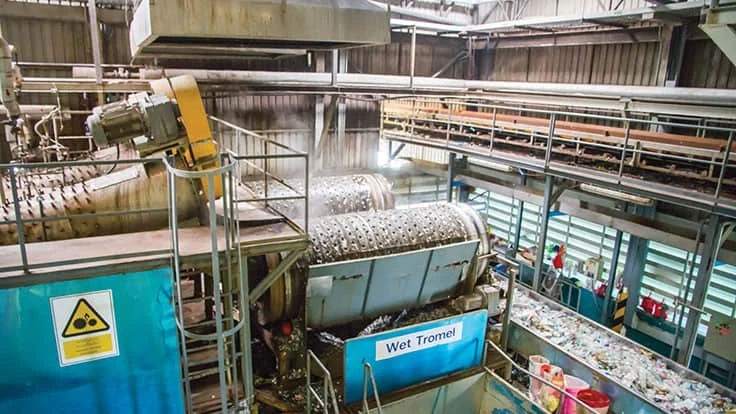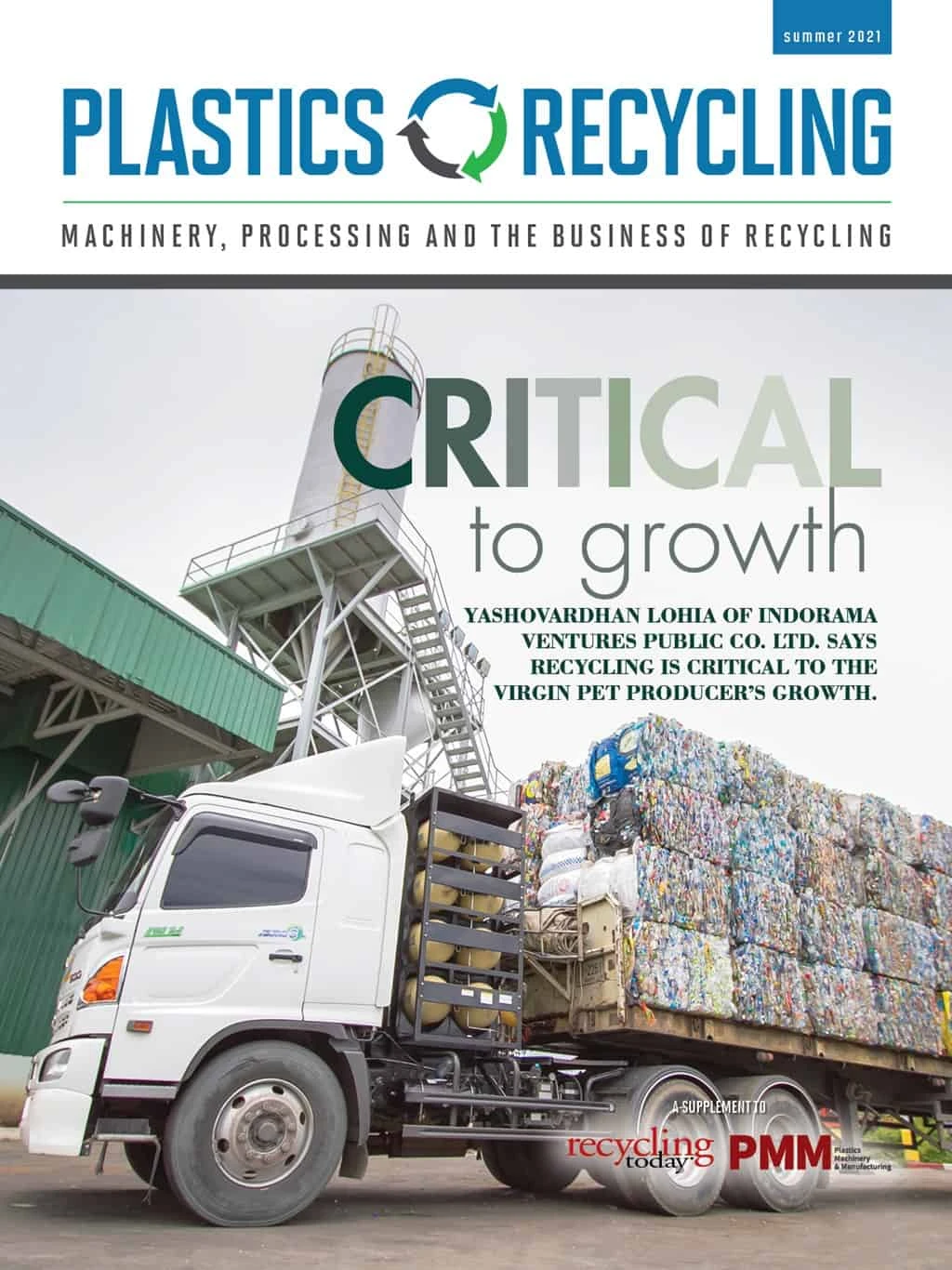
Photo courtesy of Indorama

In recent years, Indorama Ventures Public Co. Ltd. (IVL), the global polyethylene terephthalate (PET) producer with headquarters in Bangkok, has been vocal about its desire to expand its production of recycled PET, or rPET. The company is working to achieve that mission in part by acquiring established PET reclaimers throughout the world as well as by exploring chemical recycling technologies.
A GROWTH ENGINE
“As the world’s largest manufacturer of PET for packaging, IVL has a responsibility to drive the sustainability of our sector,” Yashovardhan Lohia, IVL chief sustainability officer, says. “We take this responsibility seriously,” he adds, noting that IVL is also the world’s largest producer of rPET resins. “We see recycling as a critical growth engine for IVL and the PET industry.”
Lohia points to market studies that foresee a 15 percent annual growth rate for rPET compared with a 2 percent growth rate for virgin PET.
He says consumer demand for sustainable and recyclable packaging, government plans to mandate the collection of PET bottles for recycling and global brand owners’ targets to increase the use of rPET in their packaging are factors contributing to rPET’s growth.
“Recycling is critical to our sustainable future as it delivers fewer greenhouse gases and less waste,” Lohia says. “IVL believes that the recyclable properties of PET will drive growth in our sector.”
In 2019, the global chemical producer signed the Ellen MacArthur Foundation’s New Plastics Economy Global Commitment, which calls on companies and governments to develop solutions to make their plastic packaging 100 percent reusable, recyclable or compostable by 2025. But IVL’s production of rPET began earlier than this decade.
ACQUIRING SCALE
IVL was established in 1994 as Indorama Holdings. The company was Thailand’s first worsted wool yarn producer before opening IVL’s first virgin PET manufacturing site in Thailand in 1995. IVL added U.S. operations in 2003 with the acquisition of StarPet in Asheboro, North Carolina, and grew globally from there. Today, Lohia says IVL has 124 sites operating in 33 countries across three business segments: integrated oxides and derivatives, fibers and combined PET.
The company expanded into recycling in 2011 with the acquisition of the European operations of recycler and fiber manufacturer Wellman International. Today, IVL has 13 recycling sites globally, including the Dallas site it acquired in June in an auction of bankrupt CarbonLite Holdings’ assets. (Lohia says IVL didn’t bid on the other two Carbon- Lite plants in California and Pennsylvania because of antitrust concerns.) The Dallas site has been renamed Indorama Ventures Sustainable Recycling (IVSR).
That facility joins two other recycling sites in the U.S. that IVL owns:
- Indorama Ventures Sustainable Solutions, Fontana, California, which the company acquired from Green Fiber International Inc. in late 2019; and
- Indorama Ventures Sustainable Solutions, Athens, Alabama, which IVL purchased from Custom Polymers PET LLC in early 2019.
The company also has PET recycling operations outside the United States:
- Indorama Polyester Industries, Nakhon Pathom, Thailand;
- Indorama Ventures EcoMex, Zapopan, Mexico, which the company acquired in 2014;
- Indorama Ventures Solucoes Sustentaveis Brasil, Juiz de Fora, Brazil, which the company acquired in 2020 from AG Resinas ltda;
- Indorama Ventures Recycling Poland sp. Z o.o., Bielsko-Biala and Leczyca, Poland, which was purchased from Industrie Maurizio Peruzzo in 2020;
- Wellman France Recyclage, Verdun, France, which IVL acquired in 2011;
- Wellman Neufchateau Recyclage, Neufchateau, France, which the company acquired when it purchased Sorepla Industrie in 2018;
- Indorama Ventures Recycling Verdun S.A.S, Verdun, France, which is under construction and will be powered by solar energy;
- Wellman International, Mullagh, Ireland, which the company acquired in 2011;
- Wellman International, Spijk, the Netherlands, also acquired in 2011; and
- PETValue Philippines Corp., a joint venture between IVL subsidiary Indorama Ventures Packaging (Philippines) Corp. and Coca-Cola Beverages Philippines Inc. that is under construction. The company says this plant has a projected capacity to consume just over 35,000 tons annually, or almost 2 billion plastic bottles per year, with an output of almost 18,000 tons per year of recycled PET resin.
IVL has expanded its recycling business largely through acquisition in part because this approach allows the company to acquire knowledgeable personnel in addition to equipment assets, Lohia says.
Additionally, acquiring established facilities also involves access to a ready supply of bottles for recycling, he says. When establishing greenfield recycling sites, the company also must source a steady supply of bottles to process, which Lohia says can be a challenge.
Scale is another consideration the company takes into account when considering acquisitions. As with the recent purchase of the former CarbonLite plant, Lohia says, “We want to grow our recycling capacity and quickly, but not with small sites.”

He adds that large sites are “more efficient and more economically viable.”
However, Lohia says the company’s acquisition strategy is not just based on combining existing capacity. “IVL will use our know-how to grow capacity and recycle more and more bottles,” he says. “Since 2011, IVL has built, acquired and integrated 13 recycling businesses globally. IVL successfully integrated these facilities and expanded them. This was achieved by improving operating rates, consolidating procurement, reducing fixed costs and sharing best practices across sites.”
While Lohia describes the equipment at its newly acquired Dallas site as “top of the line,” the company is planning to make some engineering adjustments to improve productivity and increase yield.
It also is in the process of adding a new wash line supplied by Italy-based Amut to the former Custom Polymers facility in Alabama that it purchased in 2019.
As of 2020, IVL’s global recycling capacity totaled 273,000 tons, Lohia says. From 2011 through 2020, IVL has recycled 58 billion PET bottles, or 1.3 million tons, and reduced its carbon footprint by 1.9 million tons.
Through the New Plastics Economy Global Commitment, Lohia says IVL has committed $1.5 billion to recycle 50 bilion PET bottles into 750,000 tons of rPET annually by 2025, which will total 25 percent of the company’s production in North America and Europe. But that’s just the start of its commitment to recycling.
AIMING HIGH
“Ideally, I would like to recycle as much PET as we produce virgin PET,” Lohia says. “We produce 6 million tons of virgin PET. And 4 million tons of that goes into the beverage sector.”
That’s a lofty goal that IVL will work toward over time. However, he says, the company will have to overcome considerable hurdles in pursuit of this goal.
For instance, Lohia says some countries have gaps in their food-contact packaging regulations that hinder bottle-to-bottle recycling, including IVL’s home country of Thailand, as well as China and India.
Additionally, Lohia says, “In developing nations, waste collection can be unregulated, ad hoc or totally inadequate. These are challenges that require attention if we are to deliver higher percentages” of recycled content, he says.
To help it address insufficient waste management infrastructure, in late 2020, IVL received a blue loan, meaning the funds are certified and tracked for projects that support sustainable use of ocean resources for economic growth, improved livelihoods and jobs and ocean ecosystem health.
The loan will help the company reach its goal of recycling 50 billion PET bottles annually by 2025, including in four Asian countries and one in Latin America, diverting plastic from landfills and oceans. The $300 million financing package was arranged by the International Finance Corp. (IFC), a member of the World Bank Group, for Indorama Ventures Global Services Ltd., a subsidiary of IVL.
The funding is helping IVL increase its recycling capacity in Thailand, Indonesia, the Philippines, India and Brazil as well as invest in renewable energy and resource efficiency projects. This marks IFC’s first blue loan exclusively focused on addressing marine plastic pollution.
“Another problem is the misperception that all plastics are the same,” Lohia says. “If consumers don’t know that PET bottles are fully recyclable or switch to packaging alternatives that have a higher carbon footprint than PET, we all lose out.”
He says IVL’s role is to provide supply-side solutions to increase the availability, quality and economics of rPET. “Governments are driving demand-side solutions. This is done by passing laws requiring recycled content in packaging.”
He cites Canada’s 50 percent recycled content mandate for plastic products sold in that country by 2030, California’s 50 percent recycled content mandate for plastic beverage packaging by 2030 and the Australian Packaging Covenant with a 30 percent recycled content goal by 2025 as examples.

“We see recycling as a critical growth engine for IVL and the PET industry.”
EXPLORING CHEMICAL RECYCLING TECHNOLOGIES

Lohia says IVL plans to use both mechanical and chemical recycling to reach its recycling goal.
“Chemical and mechanical recycling go side by side and are fully compatible,” he says.
Lohia adds that the company is still developing its chemical recycling technology, but he declined to estimate the overall percentage that chemically recycled content could represent in its overall recycled-content portfolio.
“There are three main issues to determine the future of chemical recycling,” he says, citing time, money and scale. “The science and chemistry are already there, it’s just a matter of commercializing it. Getting the right balance across time, money and scale will determine how chemical and mechanical recycling complement each other and when.”
In its exploration of chemical recycling technology, IVL worked with Ioniqa Technologies in the Netherlands and the Coca-Cola Co., headquartered in Atlanta, to produce bottles made with chemically recycled marine plastics, Lohia says. The bottles incorporated 25 percent chemically recycled marine plastic recovered from the Mediterranean Sea and beaches. “While this was a major breakthrough, it was small scale,” he adds, noting that only 300 such bottles were produced.
IVL also announced a joint venture in September 2018 with Montreal-based Loop Industries Inc., which has developed depolymerization technology that produces dimethyl terephthalate and mono ethylene glycol from end-of-life plastic feedstocks. At the time of the announcement, the partners said they planned to begin commercial production in the first quarter of 2020 at IVL’s South Carolina site. That was before a short-seller accused Loop’s patented plastic-recycling technology of being “very misleading” in December of 2020.
When asked about the status of the partnership, IVL declined to provide further information. Lohia says validating rPET content in its products is of “vital” importance, particularly where chemical recycling is involved. “People need to know and trust that the recycling claims are honest and robust.”
Lohia says that as chief sustainability officer, he sees himself as the bridge between IVL’s environmental aspirations and its time-tested business model. “As recycling will be a growth engine that drives our industry forward, we can align sustainability with traditional performance metrics like revenue and growth. I see sustainability as a transformative journey that demands that we continually improve our operations and our team. Ultimately, sustainability will drive our long-term success.”

Explore the Summer 2021 Plastics Recycling Issue
Check out more from this issue and find your next story to read.
Latest from Recycling Today
- BMW Group, Encory launch 'direct recycling’ of batteries
- Loom Carbon, RTI International partner to scale textile recycling technology
- Goodwill Industries of West Michigan, American Glass Mosaics partner to divert glass from landfill
- CARI forms federal advocacy partnership
- Monthly packaging papers shipments down in November
- STEEL Act aims to enhance trade enforcement to prevent dumping of steel in the US
- San Francisco schools introduce compostable lunch trays
- Aduro graduates from Shell GameChanger program





